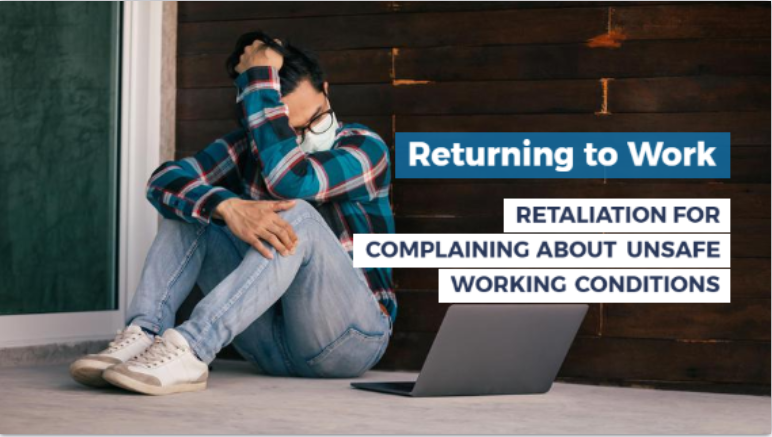(Last Updated On: December 21, 2020)

If you are required to return to work during the COVID-19 era despite unsafe or unhealthy working conditions, you have a right to file a whistleblower complaint under Section 11(c) of the Occupational Safety and Health Act of 1970 (OSH Act). If your employer takes any type of adverse action against you in response to you exercising your rights under the OSH Act, you may be able to file a retaliation claim. If you do face retaliation, it is essential to speak with an employment law attorney who can represent you.
OSHA Requires That Workplaces be Free From Unsafe or Unhealthy Working Conditions
The Occupational Safety and Health Administration (OSHA) requires employers to take steps to reduce a worker’s risk of exposure to SARS-CoV-2, which is the virus that causes COVID-19. Depending upon the type of workplace and industry, some employers may be required to take greater preventive measures than others. Indeed, OSHA explains that the recommendations can vary for workplaces considered to have low, medium, high, and very high risks of exposure.
In general, OSHA recommends employers take the following steps to provide a safe workplace in the era of COVID-19:
- Develop an infectious disease preparedness and response plan, which should include plans for increased worker absenteeism, social distancing, staggered work shifts, remote working, and other measures to reduce the risk of exposure;
- Implement basic infection prevention measures, which may involve promoting frequent hand washing, providing alcohol-based hand sanitizers, encouraging sick workers to stay home, disinfecting workplaces more often and more thoroughly, and providing workers with personal protective equipment (PPE);
- Develop procedures to identify and isolate sick people; and
- Develop plans and communicate them regarding workplace flexibilities and protections, such as ensuring flexible sick leave policies exist and providing training for effective PPE use.
What is Retaliation?
Retaliation can take many different forms, but retaliation may be any type of unfavorable or adverse employment action taken against a worker. OSHA cites the following as examples of unfavorable or adverse employment actions that may constitute retaliation against an employee because the employee exercised rights under Section 11(c) of the OSH Act:
- Firing or laying off the employee;
- Blacklisting;
- Demoting;
- Denying overtime hours;
- Denying a promotion;
- Disciplining the employee;
- Denying benefits;
- Failing to hire or rehire an employee;
- Intimidation, or attempting to intimidate the employee;
- Making threats against the employee;
- Reassigning the employee to a position that limits or prevents that employee from being eligible for a promotion;
- Reducing the employee’s pay; or
- Reducing the employee’s hours.
In order to file a retaliation claim in connection with a whistleblower complaint, the employee generally must be able to show the following elements:
- The employee engaged in protected activity;
- The employer knew about or suspected the protected activity;
- The employer took an adverse action; and
- The protected activity motivated or contributed to the adverse action.
To be clear, the protected activity would be filing a whistleblower complaint under Section 11(c) of the OSH Act, and the adverse action would be one of the unfavorable employment actions listed above.
What Can an Employee do?
If you have serious concerns about your safety and health at your workplace as a result of COVID, you may be able to refuse to work. In general, an employee can refuse to work if the following are true:
- You believe that you face death or serious injury (and the situation is so clearly hazardous that any reasonable person would believe the same thing);
- You have tried, where possible, to get your employer to correct the situation, but you have been unable to obtain a correction and there is no other way to do the job safely; and
- The situation is so urgent that you do not have time to eliminate the hazard through regulatory channels such as calling OSHA.
You also may be able to file a whistleblower complaint under Section 11(c) of the OSH Act of 1970. If you file a complaint and face retaliation, an employment law attorney may be able to assist with your retaliation claim. To seek a remedy for retaliation, your complaint must be filed within 30 days of the unfavorable or adverse employment action. Potential remedies may include:
- Reinstatement;
- Payment of back pay with interest;
- Compensation for expenses the employee may have incurred as a result of the retaliation with interest, and for emotional distress;
- Punitive damages; and
- Non-monetary relief.
Call Rodman Employment Law if You Have Been Subjected to Retaliation
If you believe your employer may have retaliated against you for exercising your rights under the OSH Act, it is important to speak with an experienced Massachusetts employment law attorney about your situation. Contact Rodman Employment Law or call our offices at 617-925-6588.


